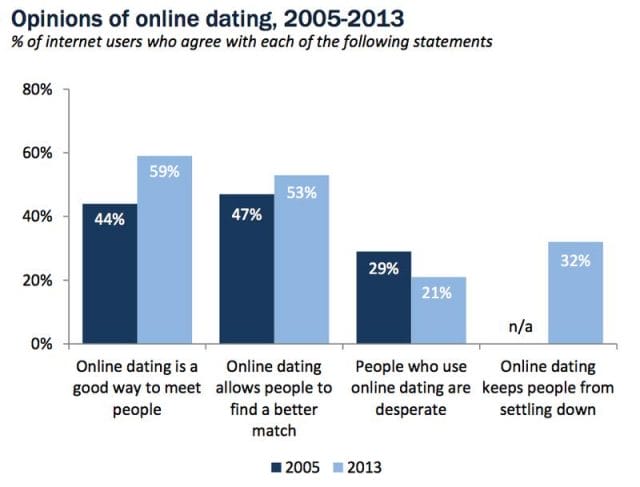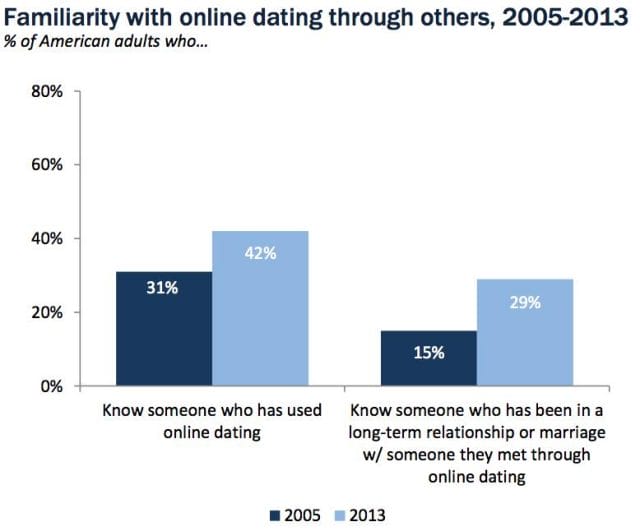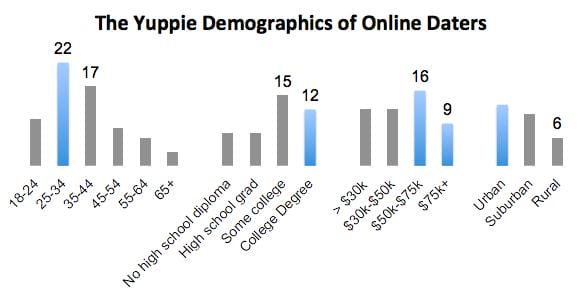
Source: Online Dating & Relationships, Pew Research Center
The data doesn’t lie. The majority of Americans over age 18 now believe that online dating is a good way to meet people. Only 21% believe that Match.com, eHarmony, and Tinder are for desperate people. And the numbers are moving in online dating’s favor. As Simone Foxman wrote in Quartz, soon children will be asking their parents, “Mommy, which app did you meet Daddy in?”
These figures come from a study by the Pew Research Center. The questions Pew uses to measure online daters have changed over time, so Pew does not release a growth figure for the total online dating population. But the study notes that the percentage of Americans who used an online dating site increased from 3% in 2008 to 6% in 2009 and 9% today. Total users rises to 11% in 2013 if you include users of both online dating sites and mobile apps. And Americans are not just creating empty profiles. Sixty six percent of users went on a date with someone they met online and 23% met a spouse or long term partner.
Among those who have not tried online dating, it is no longer a strange phenomenon. More and more Americans know someone who met a match online.

Source: Online Dating & Relationships, Pew Research Center
In this case, familiarity is breeding not contempt but increased revenues and an avalanche of new dating apps. Some sites have risen while others have fallen. The fall of Yahoo and MySpace hit online dating as well:
| 2005 | 2013 |
| Match.com (29%) | Match.com (45%) |
| Yahoo Personals (21%) | eHarmony (23%) |
| eHarmony (11%) | Plenty of Fish (17%) |
| MySpace (7%) | OK Cupid (15%) |
| Adult Friend Finder (4%) | Christian Mingle, Zoosk (2%) |
Source: Online Dating & Relationships, Pew Research Center
Our perception of online dating is that it started as a means for older, divorced Americans to find a new match, but has since been taken up by busy, young professionals in urban centers who lack the time to find new dates through traditional means. Pews demographic data on online data mostly bears that out.

Data source: Online Dating & Relationships, Pew Research Center
Online dating is most popular among the yuppie demographic (in blue) as seen by age, education level, salary, and environment. One surprise is that online dating is more popular among those with only some college experience than those who graduated college. We are at a loss as to why. We suspect that the low popularity at the highest salary level reflects the higher average age of that demographic. The fact that nearly a quarter of Americans between ages 25 and 34 date online shows just how quickly online dating has grown.
Any fogies concerned that those kids with their twitters and their tinders are using online dating just to hook up should know that online daters are definitely doing that. But they are also entering long-term relationships and getting married. Five percent of Americans who are married or in long-term relationships met online – 11% if you restrict your view to couples who have been together for 10 years or less.
Most people turn to sites like Match.com and OK Cupid to kickstart the dating process. But there is some evidence that online dating is also improving Americans’ long term dating outcomes. A group of researchers from Harvard and the University of Chicago have found that the marriages of couples that met online (they include individuals who met anywhere online – including over Facebook or email) were “slightly less likely to result in a marital break-up and were associated with slightly higher marital satisfaction.” In other words, marriages that started as a Tinder hookup may be happier than high school sweet heart marriages.
After controlling for the different demographics of married couples who met online versus offline, the researchers concluded that the results remained the same. Whether it is the matching algorithms, the fact that online daters go on more dates from a wider pool of potential matches, or some other factor that is responsible, online dating seems to be working as promised.
To get occasional notifications when we write blog posts, sign up for our email list.



